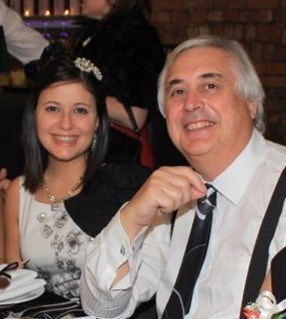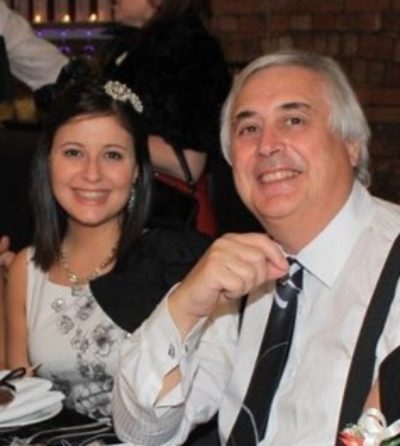



Early diagnosis: a doctor’s perspective
A&E doctor, Harriet Evans writes in support of our Unite-Diagnose-SaveLives campaign by sharing the story of how she lost her dad to pancreatic cancer.
Two years ago, Dr Evans became worried when she noticed that her dad, Iwan, had lost a lot of weight in the space of a few months. When he was diagnosed with pancreatic cancer, in August 2017, Harriet knew that the statistics were awful but she was hopeful when he was offered surgery – the only potential cure.
We were on a family holiday in June 2017 when I noticed that my dad, Iwan, had lost a considerable amount of weight. It was the first time I had seen him for a few months so it was very noticeable. Around a month and a half later, he had a routine set of blood tests, the type that he would normally have at a yearly check-up. As an A&E doctor myself, I was worried about the amount of weight he had lost because it was quite significant. So I mentioned to my mum about requesting a test for suspected bowel cancer at the same time.
When he got his results back a couple of weeks later, I got a phone call from my mum telling me that he’d just been diagnosed with type two diabetes and these results were unusually high. This combined with his weight loss, set alarm bells ringing in my head. After some persistence, my dad had an ultrasound scan in mid-August, which showed that he had a mass in the head of his pancreas.
As soon as my Mum told me I burst into tears and went straight to my dad to give him a hug. We all knew that this wasn’t good news.
I expected the worst because I’ve had patients with pancreatic cancer, most of whom didn’t survive two or three months. That’s why doctors like me need a simple test to be able to diagnose pancreatic cancer as soon as possible.
My mum, my sister and I all knew that the prognosis for pancreatic cancer was awful. I was really upset, thinking he wouldn’t make it to my birthday the following June.
That week he had a CT and they got the results back quickly. At that point, it was still looking very positive. It seemed that he had a localised cancer that hadn’t metastasised so he was eligible for surgery. Shortly after that, he became jaundiced so had a stent put in to relieve it. While all this was going on, he was seeing one of the professors in the local hepatobiliary centre where they offered him the option of potential surgical curative treatment. When we found out that it might be operable, it gave me quite a lot of hope and I thought that he might have a chance.
He had a laparoscopy in mid to late-September, which showed that the cancer was confined to the pancreas and didn’t look like it had spread anywhere so they could get him into surgery in the following two weeks. In the end, he went into surgery less than a-week-and-a-half later. It all seemed so positive. He was in theatre for most of the day, around eight or nine hours.
Unfortunately, the team at the hospital had not been able to contact us so we all thought that the procedure had been successful. As a result, my dad had been in the ward on his own when he got the bad news. During surgery, they were unable to remove the cancer because it had spread to his lymph nodes. They performed bypass surgery instead, to relieve some of his symptoms and improve his quality of life. When we realised that his cancer wasn’t operable we had about ten months with him. That was a really awful day.
My sister and I were desperately searching for clinical trials to see if there was anything that might help at all. We were aware of how poor the prognosis was, especially now he wasn’t having curative surgery. I emailed Pancreatic Cancer UK for advice and managed to speak to someone about a trial but he wasn’t able to take part in it. So my dad had two rounds of chemotherapy. In June 2018, he had another scan, which showed that despite his chemotherapy, the disease progressed and was causing problems in his lungs. So, they stopped his treatment.
Because pancreatic cancer progresses so quickly, I honestly think that if it had been picked up a couple of weeks earlier, he would have been able to have a successful operation and he might be here today. Ten days before he went into theatre, there was no lymph node involvement, but it all changed so quickly.
We had another few months with him before he passed away on the 1st September – only a year and two weeks from his diagnosis. Honestly, we actually expected it to be a lot less given the statistics. We were lucky to get longer with him than we all anticipated but it still wasn’t very long to come to terms with what was happening.
As doctors, we’re taught that the classic symptom of pancreatic cancer is painless jaundice but it can also cause a new onset of diabetes and significant weight loss. Unfortunately, there are so many other things that can cause those symptoms, so pancreatic cancer isn’t always the first thing that comes to mind. The symptoms are quite vague and extremely hard to diagnose which is why nearly half of patients don’t get diagnosed until they reach A&E. By then it’s too late.
We need a simple test to help us diagnose pancreatic cancer early enough for treatment.
To take on this challenge, Pancreatic Cancer UK are bringing together scientists to make a simple test possible.
Together we can unite to fight for early diagnosis and save lives.

